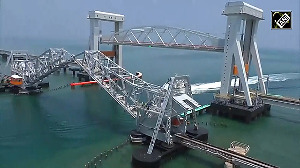 India has become the most sought destination for investment by Japanese companies, next to China, and ahead of other Asian countries and emerging economies like Russia, Brazil, Mexico and even the United States and the United Kingdom.
India has become the most sought destination for investment by Japanese companies, next to China, and ahead of other Asian countries and emerging economies like Russia, Brazil, Mexico and even the United States and the United Kingdom.
According to a recent survey by the Japan Bank for International Cooperation covering 620 leading Japanese manufacturing companies, 278, or 58 per cent, wanted to do business with India in the medium term, behind 74 per cent for China. The next best destination for Japanese manufacturers after India is Vietnam, way below with 31 per cent support.
The survey reflects Japanese companies' mounting interests in Indian businesses, especially in sectors such as automobiles, IT, infrastructure, steel, power and pharmaceuticals.
Japan now ranks sixth in the list of foreign direct investments in India, in a list dominated by Mauritius, which accounts for 44 per cent of cumulative FDI in India.
Japanese companies invested only Rs 382 crore (Rs 3.82 billion) in India in 2006-07. This rose to Rs 3,386 crore (Rs 33.86 billion) in 2007-08 and then dipped to Rs 1,889 crore (Rs 18.89 billion) in 2008-09. Up to this September, the FDI inflow from Japan has touched Rs 3,857 crore (Rs 38.57 billion), the highest ever in a year.
Besides money, Japan's advanced technologies are also flowing to India.
Of the 8,000-plus foreign technology transfers so far approved by the Indian government, Japan accounts for 10.88 per cent, with 879 approvals, in third position behind the US and Germany.
Takeda Pharmaceuticals, the largest drug maker in Japan, will start selling drugs in India. So is Astellas Pharma, the second largest Japanese drug maker, which started Indian operations a few months earlier.
The third largest, Daiichi Sankyo, had stunned the pharma world in India last year by acquiring the largest drug maker, Ranbaxy Laboratories, for Rs 19,803 crore (Rs 198.03 billion).
"We teamed with Ranbaxy to create a hybrid long-term model in drug business globally, leveraging the innovator capabilities of Daiichi Sankyo and Ranbaxy's great generic drug-making skills and global reach," says Tsutomu Une, chairman of Ranbaxy Laboratories and executive director of Daiichi Sankyo.
Eisai Co, another leading Japanese drug maker, is making India its major manufacturing hub and is setting up a huge facility at Visakhapatnam, with an investment of Rs 1,900 crore (Rs 19 billion).
Japan's business interests are obvious, as India's pharmaceutical market is expected to reach an estimated $20 billion by 2015, with one of the highest growth rates in the world, at 12 per cent.
"Building relationships and winning their trust are the two key factors in establishing business links with Japanese companies. Then comes factors like time lines, quality and project management skills," notes Abhijeet Ranade, associate director, PricewaterhouseCoopers.
Japan is also showing interest in India's infrastructure development. JBIC had extended a Rs 715-crore (Rs 7.15 billion) loan for L&T-MHI Boilers (LTMB) and L&T-MHI Turbine Generators, two joint venture companies being set up by India's engineering major Larsen & Toubro (L&T) and Japan's Mitsubishi Heavy Industries (MHI), to make boilers and turbines for thermal power plants at Hazira in Gujarat.
It will also fund close to Rs 20,000 crore (Rs 200 billion) in developing the Mumbai-Delhi rail freight corridor. Japan International Cooperation Agency (JICA), a government arm, had provided a ¥137-billion (Rs 7,000 crore -- Rs 70 billion) loan for 2008 to set up drinking water facilities in Hogenakkal, Kerala and Guwahati, besides constructing the Delhi Metro.
Cumulative investments by Japanese companies in India are to the tune of over Rs 15,000 crore (Rs 150 billion), about 3 per cent of the overall FDI in India, according to data from the Department of Industrial Policy and Promotion.
India's leading IT players have significant presence in Japan and majors such as IBM, Accenture, Wipro, Infosys, TCS and Patni have already set shop there to outsource work to India. Japan is the second largest IT spender in the world at over $108 billion annually, next to the US.
"At present about 40 per cent of IT work related to Japan is done in India and this may increase to 60 per cent within the next few years," said a specialist in the global IT scene.
JFE Steel Corporation, the world's sixth biggest and the second largest steelmaker in Japan, will invest in Sajjan Jindal-promoted JSW Steel, to pick up a minority stake, besides jointly making auto grade steel and setting up a mega integrated steel production facility in West Bengal.
"We are working out the details and JFE Steel's investment in JSW Steel will happen in a few months," said Sheshagiri Rao, joint managing director and group chief financial officer of the JSW Group.
Analysts feel Japanese companies are likely to invest above Rs 1 lakh crore (Rs 1 trillion) in India in the coming three to five years.
Automobiles have been attracting huge investments from Japan. For two decades, Indian roads have been flooded with Maruti Suzukis. Soon, more Japanese-made small cars will debut on Indian roads, like Nissan's Micra. Nissan is planning to shift the entire production of Micra, from the UK to India, to be followed by two more models. The company is setting up a plant in Bangalore, with an investment of over Rs 4,500 crore (Rs 45 billion).
Similarly, Toyota Motors will also make India a hub for making its small cars. Toyota will invest over Rs 2,500 crore (Rs 25 billion) by 2011 to set up a second plant in Bangalore to increase its capacity by four times. Another Japanese automobile major, Honda Motors, will launch its small car in India by 2011.
Japanese truck maker Hino Motors is also planning to sell over 700 trucks in India this financial year and will set up a manufacturing unit within three years, say sources. And tyre maker Bridgestone is setting up a new plant at Pune with an investment of over Rs 2,000 crore (Rs 20 billion).
"For sustainable growth of the Indian economy, India and Japan have to move forward in environmental cooperation by making most use of Japanese environmental technologies and financing," says Takashi Hongo, JBIC's Special Advisor and head of its environment finance engineering department.










 © 2025
© 2025